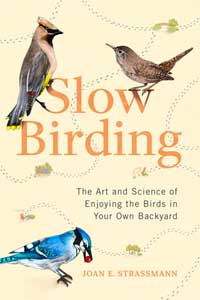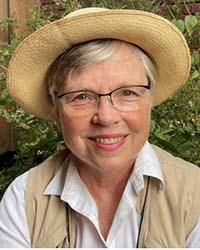
In the heart of migration, it is easy to move from one golden jewel to another, racking up warblers, vireos, tanagers, and thrushes in number. But there is another way to immerse yourself in birds, and that is the focus of Slow Birding. It involves simply watching how an individual moves through time and space, how it interacts with other birds, and what decisions it is called on to make. Get to know the commonest birds, not just by sight, but by the kinds of things they do.
In her book, Slow Birding: The Art and Science of Enjoying the Birds in Your Own Backyard, Joan Strassmann tells stories about some of our commonest birds, stories that ornithologists have devoted their lives to learning. Read it and you will learn that American Robin fathers feed babies more if they have hatched from bluer eggs. Cooper’s Hawks that mostly hunt birds have a longer toe than normal to snatch them out of the sky. Male Snow Geese follow their partners to their mating grounds. White-throated Sparrows have something like four sexes. These and many more stories enrich our experiences of these easily seen birds. She will share a few of them in this presentation.

Joan Strassmann is Charles Rebstock Professor of Biology at Washington University in St. Louis, where her research focuses on social interactions and mutualisms of amoebas and bacteria. She received her Ph.D. in zoology at the University of Texas at Austin, where she studied social cooperation and conflict among paper wasp families. She has published more than 250 articles on social interactions in wasps, stingless bees, social amoebas, and bacteria. This work has been recognized by a number of awards, including a Guggenheim Fellowship and election to the U.S. National Academy of Sciences.
More recently she turned her attention to scientific communication, particularly to stories of birds and the scientists that study them. She recently published Slow Birding: The Art and Science of Enjoying the Birds in Your Own Backyard and is working on The Social Lives of Birds, to be published by Little, Brown Spark.

